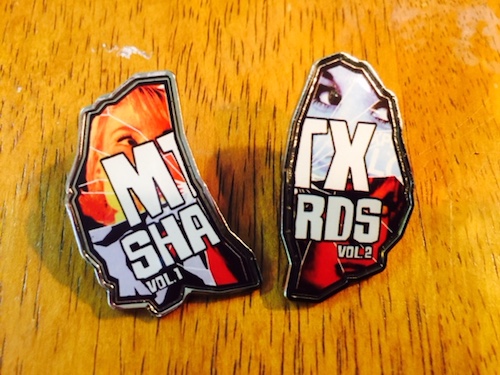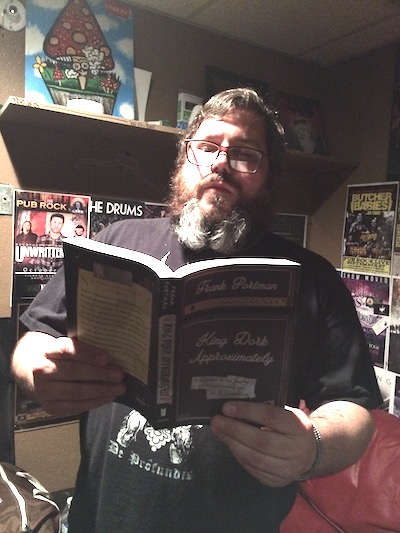May 16, 2017
Dashiell Hammett, Agatha Christie, Judy Blume, and Van Halen
I've been re-reading The Maltese Falcon (the same Vintage paperback edition I read as a teenager, as it happens.)
I noticed a minor, slightly screwy detail that bothered me a whole lot more (I'm sure) than it would bother most people. (I have reason to believe, after years of complaining about this sort of thing, that I may be the only person who cares about it, in fact.)
In Chapter Seven, Sam Spade tells Brigid O'Shaughnessey an anecdote about a real estate agent in Tacoma, Washington, a digression that has become known as the "Flitcraft Parable." The reason it's in there at all has been a matter of much debate over the years, but that's not what bothered me. What bothered me is that, in the text I was reading, Spade says the events took place in 1942, with his own participation in the tale beginning in 1947.
Now, as a teenager I may not have known (or cared) that The Maltese Falcon was originally serialized in the Black Mask in 1929, and published as a stand-alone book the following year. But now I am well aware of it, and seeing these dates was jarring. The question nagged at me: why the hell does Dashiell Hammett, in 1929, have his character tell an anecdote that takes place in 1942?
Well, he didn't, of course. Somewhere along the editorial line, some benighted editor decided it would be a good idea to "update" the text. (Just to make sure I wasn't missing something, I acquired a facsimile printing of the first edition -- the actual first edition costs thousands of dollars - and in it, the anecdote dates to 1922 and 1927, as I guessed it must.) I suspect this change was a misguided attempt to make the text seem "contemporary," less old-timey to its 1972 paperback-buying audience. It's a stupid edit, for a whole lot of reasons. (a) making a book contemporary and up-to-date is by definition a losing battle -- it's out of date the day after it's published anyway; (b) no one is fooled by such alterations into thinking that an internationally famous classic of modern American literature was written yesterday, nor should they be; (c) far from helping the reader in any way, it sows confusion, and in fact if you're a weird semi-autistic type like me it sows actual anxiety; and (d) and most importantly, it is fundamentally dishonest and inaccurate, even if it does serve some legitimate purpose (which, as far as I can tell, it doesn’t.)
But the worst part of it is, there's no way of knowing what has happened to the text and why, or whether anything has happened to it at all. As I said above, I've complained about this before, to the sound of crickets and rolling eyes. Here I am reading an Agatha Christie novel where original dialog referring to W. Somerset Maugham's The Moon and Sixpence was changed to read "a life of the painter Gaugin", a similarly stupid edit that confuses far more than it clears up. They updated the "menstrual technology" in later editions of Are You There God, It's Me Margaret? Sometimes, with these edits, you can see their point (Dr. Doolittle and Charlie and the Chocolate Factory); sometimes you can see the point but it still seems like a bad idea (Huckleberry Finn) or an unintentionally comical one (The N-Word of the Narcissus.) Sometimes, it is outright nefarious: in the eighties, the estate of James Joyce, in what can only be described as an act of literary vandalism, tried to alter the text of Ulysses in what appears to have been an attempt to justify re-starting the copyright clock. And the text of A Separate Peace has evidently (see the first comment to this post on Lark's Vomit") been edited in some school editions to exclude homoerotic intimations, which is just... how was there a book left after that, in the end?
Evidently, this sort of thing goes on all the time, but since there's never an indication that the alterations have been made, there's no way of knowing the extent of it. You just stumble on little examples it here and there when you happen to notice something that seems weird enough to investigate. And hope for the best. And, all the more so I suppose in this day of electronic everything, unless you have a physical first edition, you can't be absolutely certain that you're reading the actual text as published.
But really, everyone is saying, I know: what's the big deal? It's just a couple of dates, and, big picture, so what?
So of course, my thoughts turn to Van Halen.
When I was a kid, the rock band Van Halen was notorious for their outrageous contract rider, which famously insisted that there be no brown M&Ms anywhere in the venue. This was seen as the epitome of Marie Antoinette-level rock star excess, abuse, and entitlement. People who hated Van Halen were quick to mention it as an indictment of their pettiness, their vapidity, their general out-of-touchness. What's the problem with a few brown M&Ms, ya jerks? I never hated Van Halen, particularly, but I admit I saw it that way too. But there was method to the madness, and I'll let David Lee Roth explain:
If they're not following the M&M part of the contract, what else aren't they following? The presence of brown M&Ms was a warning sign that something else could be awry. You don't want the stage to fall down.
And that's how I see the dates 1942 and 1947 in my paperback edition of The Maltese Falcon: as brown M&Ms, basically. In effect, the publisher has (for an unspecified but almost certainly stupid reason) violated the contract, in which they were obligated to present the actual text of the novel as written by the author and originally published, read, and criticized by the public. And while a brown M&M or two may be nothing to get worked up over, the question remains: what else has been altered, left out, elided, bowdlerized? Probably not much, but then again, who knows? There’s no way to check. There is homoerotic content in The Maltese Falcon, after all, and some of it’s not very polite. If they can do it to A Separate Peace, they can do it to anything. Our culture seems to get more censorious by the day, and there's no reason to assume that books are safe. Did I mention I'm semi-autistic and paranoid? No? Well, yeah, I'm also paranoid.
As I've said before, I'd love it if the full editorial history of a given book were made available somewhere, as standard practice, so there would be a way to know what changes have been made, when, and (even better) why. That would dispense with my complaint. I just want a way to know. It could be part of the copyright information at the front of a book, or could be available in an online database. Of course, as my eminently practical girlfriend pointed out, that's an "app" that would have about twelve users. It's not going to happen. So, my reading habit, at least as far as best practices are concerned, just got a whole lot more expensive. It's first editions from here on out. I don't want the stage to fall down, you see.
May 03, 2017
Shards Vol. 1 and 2, pins

The Shards 1+2 pins are in and they are cool. Sounds Rad is sending them out to those who've already ordered the digital albums.
New orders get them too, while supplies last. They're limited though.
